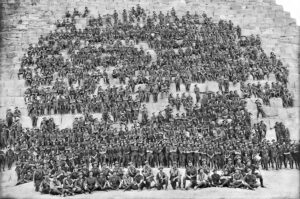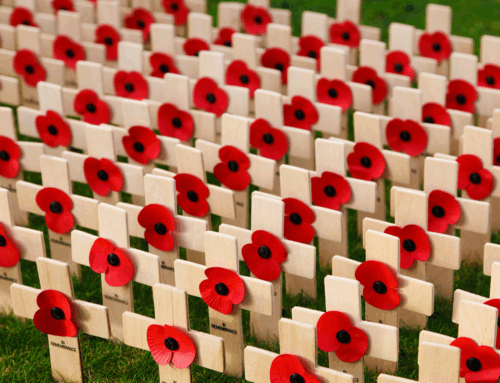Bingo Lingo: Legs Eleven is innocent!
Legs Eleven has been wrongly labelled as sexist. Its origin can be traced back to World War I. First seen in an article in an Australian publication in 19161, which is fitting because Australia is likely the origin of the term. Legs 11 is Aussie slang for a tall, thin man.2

Group portrait of all the original officers and men of the 11th Battalion, 3rd Brigade, AIF. The group of over 685 soldiers are spread over the side of the Great Pyramid of Khufu (Cheops) near Mena camp.
It is also the nickname of the 11th Battalion, Australian Imperial Force3, one of the first Australian infantry units raised during World War I. Recruiting in Western Australia with a brief training period in Perth, the battalion sailed to Egypt, where it undertook four months of intensive training, before in April 1915 it took part in the invasion of Gallipoli, where within just five days over a third would be killed.4
According to Max Elskamp, the famous Belgian poet, in his book about bingo published during World War I:
“When this number is mentioned, players will sometimes say: “The Legs of Catherine, Thérèse, or Marie,” alluding to one of these personalities known to them, who may be wobbly, or whose legs have some peculiarity that lends itself, for one reason or another, to ridicule and, therefore, indirectly, may provoke laughter. Thus, in Antwerp, number 11 corresponds to: “The Legs of Van Dyck,” alluding to the statue of this painter supported by exaggeratedly slender extremities.”5
In British World War I slang Legs Eleven is the nickname for an officer with exceptionally thin legs.6 & 7
Wilfrid Ewart was a tall man, rather more than six foot two, thin, fair-complexioned, with considerable colour in his cheeks; he had grey eyes…
… He was a terror to G Company at rifle inspection: no speck of rust escaped the vigilance of that one eye. If “Legs Eleven,” as they cheerfully called him, was going to inspect rifles, many trembled in their shoes.8
“THE SUICIDE CREW.”
We’re a happy party the machine gun Corps,
We have our laughs and jokes galore,
We find the brightest spots in life,
Avoiding gloom and useless strife.
We’re Sergeant, one of the best,
Who’ll hold his own with all the rest.
One who knows his duty well,
One who has faced the enemy’s shell.
And then there’s “Dinkie,” second in charge
Who though only small, his heart is large.
If ever we’re without a smoke
We’ve only nicely to him talk.
There’s “legs eleven,” tall and slim,
And a smart lance-jack, whose name is Jim.
Corporal Clark our right-hand man,
Wise and Bray, so spick and span.
Our privates are a cheery crew
And always ready their duty to do.
First there’s one named “Little Tet,”
Who got his name from Harrogate.
Then there’s Atkins, who is a sport,
And Ted Gawthorpe, a right good sort,
Ward and Crompton full of fun,
Who many a fishy yarn have spun.
Day and Adams are rookie’s raw
Who will in time their talents show.
And now you’ve got the machine gun corps,
And one smarter you never saw.
TEX9
Sexism
The origin of the sexism might not be the call itself, rather the response from the audience, which was a wolf whistle. According to the Oxford English Dictionary (OED), A wolf whistle is a rising and falling pitch directed towards someone to express sexual attraction or admiration.10 With this definition, you could argue that the response is sexist. According to the OED, the first recorded use of “wolf-whistle” was in 1944. So, the call predates its ‘sexist’ response.
To deflect its sexism tag, people have scrabbled to reference it to other types of legs, Chicken, for example.11 & 12
One bingo fan even had the police called, was ejected from the Bingo Hall and ultimately banned for his ‘sexist’ Wolf-whistle response to Legs Eleven.13 & 14
References
1 Haircutting Under Fire, Bendigonian (Vic.), 20 Jan 1916, Page 31
2 W. H. Downing, Digger Dialects: A Collection of Slang Phrases used by the Australian Soldiers on Active Service, Lothian. 1919
3 Walter C. Belford, “Legs-eleven” being the story of the 11th Battalion (A.I.F.) in the Great War of 1914-1918, Imperial, 1940
4 11th Battalion (Australia): Wikipedia (accessed on 10th July 2025)
5 Max Elskamp, Les Commentaires et l’idéographie du jeu de Loto dans les Flandres suivis d’un glossaire. J.E. Buschmann, 4th June 1914 [Actually published 1918, the earlier date was to avoid German censorship in occupied Antwerp during WWI]
6 Notes and Queries, Twelfth Series.— Volume IX, The Times Publishing, 26th Nov 1921, Page 424
7 Basil Hargrave, Origins and Meanings of Popular Phrases & Names, J. B. Lippincott Company, 1925, Page 366
8 Stephen Graham, Life and Last Words Of Wilfrid Ewart, G. P. Putnam’s Sons, 1924, Pages 14-16
9 TEX, The Suicide Crew, Hull Daily Mail, 24th July 1924, Page 3
10 The Oxford English Dictionary: Wolf Whistle
11 Jeff Davis, Bingo Slang Terms, bingohouse.com, 22nd January 2013 (now defunct – link to Web Archive)
12 Paul Dickson, Slang The Topical Dictionary of Americanisms, Walker & Company, 2006, Page 166
13 Wills Robinson, Bingo fan who wolf-whistled every time they called ‘legs 11’ is thrown out by police and banned for being sexist, Mail Online, 10 March 2014
14 Mike Lockley, Bingo fan barred for wolf-whistling every time ‘legs 11’ called out, Birmingham Live, 10 March 2014



[…] 11 […]